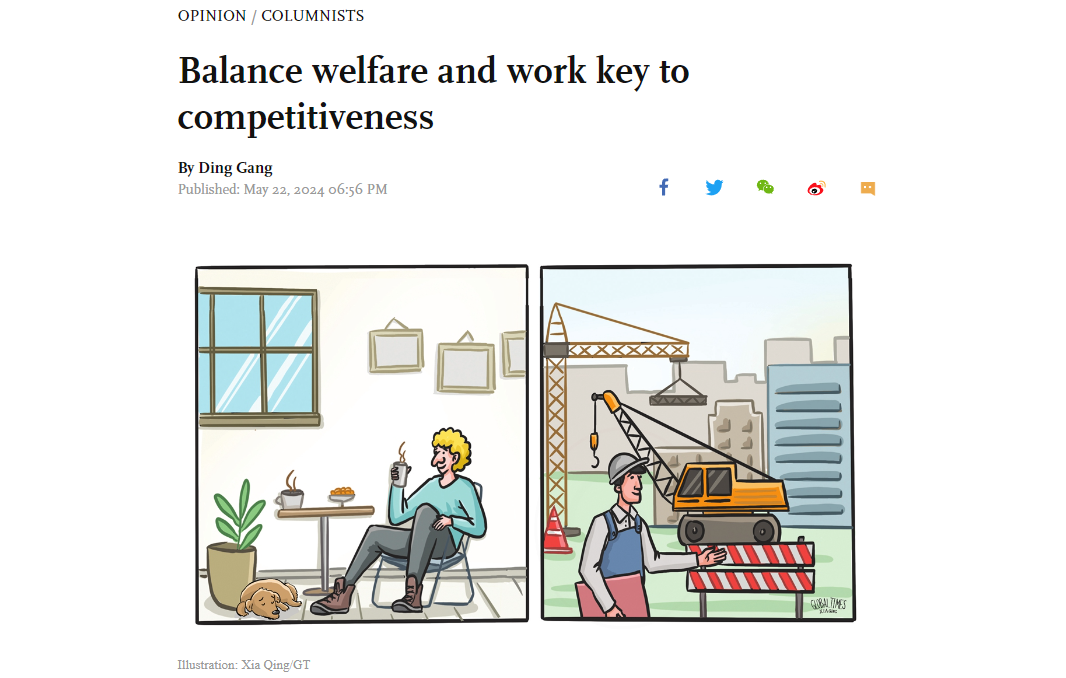LATEST INSIGHTS
Your Present Location: LATEST INSIGHTSDing Gang: Balance welfare and work key to competitiveness
Source: GT Published: 2024-05-22

A recent editorial in the Financial Times, titled 'Time to get Europe back to work' highlights a daunting challenge the European economy faces: an increasing number of individuals opting to 'lie flat.' This issue, however, is not unique to Europe; it is a common ailment of post-industrial societies. Even China, amid the transition from industrialization to a post-industrialization society, is witnessing similar phenomena.
This phenomenon has caught the attention of European media mainly because, in the context of globalization, the competitiveness issue has become increasingly prominent. The European Union is feeling increasing pressure of efficiency competition with the US and China.
Cultural factors mainly influence labor participation rates. However, economic conditions and social welfare system shifts can also impact culture.
European countries have generally established comprehensive social security systems that provide basic living guarantees for their citizens. While this has been beneficial, it has also made people less motivated to actively seek employment. Some individuals can maintain a relatively comfortable lifestyle by relying on various welfare benefits, lacking the drive to enter the labor market.
Moreover, as societies progress and values become increasingly diverse, more and more Europeans pursue higher-quality lifestyles, emphasizing work-life balance and being unwilling to sacrifice personal time and family life to earn money. To a certain degree, the 'lying flat' phenomenon reflects a rebellion against the current societal overemphasis on competition and materialism.
The Financial Times editorial should serve as a reminder that the Chinese people should pay attention to the competition of productivity. This competition, particularly in the post-industrial age, continues to focus on stimulating people's work ethic and diligence through policy reforms and adjustments.
In traditional Chinese culture, values such as diligence, frugality and family responsibility are deeply ingrained. Compared to Europe, China's per capita income level is still relatively low, and most people need to work diligently to improve living conditions of their family, provide better education for their children and prepare for their retirement.
This notion of 'working hard to become prosperous' is deeply rooted in the hearts of Chinese people. Even after the high-speed economic growth phase, it still significantly influences the work ethic of the Chinese. The hardworking delivery couriers who tirelessly navigate city streets day and night, rain or shine, are a microcosm of the diligent qualities of Chinese workers.
However, we must recognize the challenge is coming, with the relationship between labor participation rates and productivity. There is a specific connection between the two, such as higher participation rates often leading to greater output. However, improving productivity is more crucial, which means working more diligently and increasing output levels and labor remuneration per unit of time.
For a long time, European scholars have believed that the productivity gap between Europe and the US reflects the severity of this issue. If China wants to narrow the gap with developed countries, it must also focus on resolving this problem.
The FT editorial suggests that the top priority of European governments should be to readjust the balance between welfare spending, marginal tax rates and minimum wage standards, establishing more effective labor incentive mechanisms to encourage people to seek employment and start businesses actively. This is the only way the declining trend in labor participation rates can be fundamentally reversed and economic vitality stimulated.
China needs reforms and adjustments like those mentioned above to encourage more young people to strive hard while ensuring that more young people feel a sense of achievement.
Many worry that although the current income of labor groups like delivery couriers can maintain their family's livelihood, they may not be able to afford quality housing or enjoy basic social security when they are too old to engage in physical labor. These concerns have yet to be satisfactorily addressed.
Eliminating these worries requires creating more opportunities for the younger generation to showcase their talents and instill lasting confidence in a better life.
The key to achieving sustainable economic and social development is closely integrating the improvement of labor productivity with the enhancement of people's well-being and ensuring that the fruits of development benefit all people more equitably, with a new path to Chinese modernization.
The author is a senior editor with People's Daily, and currently a senior fellow with the Chongyang Institute for Financial Studies at Renmin University of China. dinggang@globaltimes.com.cn. Follow him on Twitter @dinggangchina























































































 京公网安备 11010802037854号
京公网安备 11010802037854号





